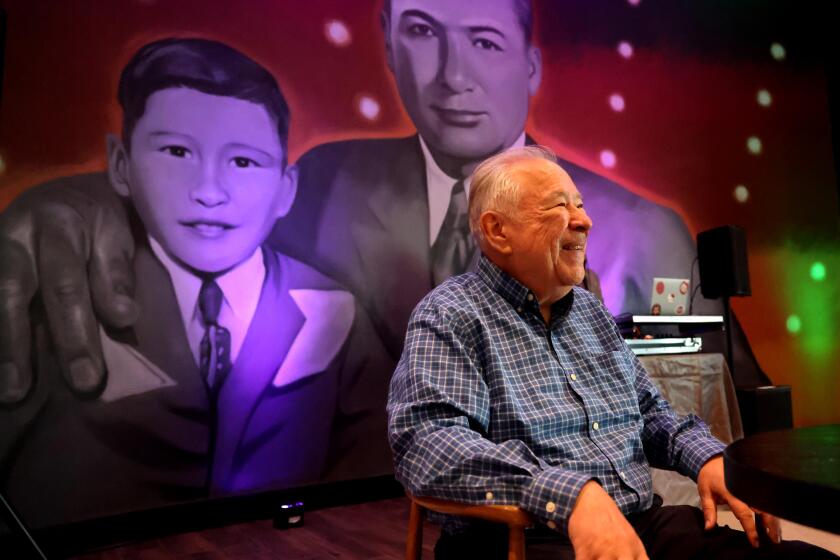‘WIRED’ NEARS ITS SCREEN TEST
Schwab’s Pharmacy has been closed for more than three years now, and starlets aren’t often discovered at restaurant counters. But fame still can come fast in Hollywood.
Two weeks ago, Michael Marx was working for a computer company. Last week, the 25-year-old Northwestern graduate gave notice. After a nine-month search that involved more than 500 actors--Marx was literally the last candidate to come through the door--Marx was tapped to portray actor John Belushi in the movie version of Bob Woodward’s 1984 book “Wired,” being produced by Ed Feldman and Charles Meeker and directed by Robert Markowitz.
The dossier: Marx is single, an unknown (minimal film work) and not a Belushi lookalike. He was chosen, according to one insider, primarily for his ability to blend a ferocious sense of comedy with a disarming vulnerability, the same unique qualities that made Belushi so endearing.
The news is not so much who was chosen, but that anyone was chosen at all. The scandal surrounding Belushi’s drug-related death makes “Wired” a controversial movie in Hollywood. Now, with the mood of both the country and Hollywood hardening against drug use and its depiction, the timing makes the movie even more of a long shot. The subject of drugs is probably avoided now not so much because the studios want to send out an anti-drug message, but because the genre is fairly played out.
Though “Wired” was No. 1 on the New York Times Best-Seller List, the book was not a popular read within the movie-making establishment. Belushi was seen as a brilliant talent whose life ended as a tragic misfire. He symbolized the best and worst of what Hollywood has to offer, and the book suggested that the pampering and indulgence typically afforded such stars may have contributed to his death.
Hardly the stuff of movies in the eyes of the major studios where the subject of drugs is a virtual taboo. Not surprisingly, when producer Feldman acquired the rights to Woodward’s book last year, he decided not to take the project to the major studios.
“We knew no major studio would touch it,” Feldman said. “We felt that under the studio system the movie would never come out the way we planned to make it.”
So, Feldman and partner Meeker, who produced “Witness” and “The Hitcher,” among other films, financed the writing of the script (by Earl Mac Rauch) themselves and raised the money for production without the aid of a major studio. Budgeted at about $10 million, the film will start shooting in February.
Still, the resistance to it in Hollywood remains. There are those, like writer-director Neal Israel (“Bachelor Party”), a Belushi admirer, who are offended by the very idea of such a film. “This is a real exploitation of Belushi,” he said. “Whatever problems John had or did not have are totally speculative. I feel terrible for the people he (Belushi) left behind. That they have to go through the ordeal of seeing that is awful.”
“Let the man rest in peace,” said one frustrated agent who insisted on anonymity. “You can tell by the nature of the casting (an unknown) they weren’t able to get anyone of note. Look, mainstream Hollywood passed.”
Director Markowitz (“Voices”) acknowledged that the initial and continuing backlash against the film caught him off guard. “John Belushi was a very funny man who died a tragedy and that tragedy was drugs,” Markowitz said. “He was also a national treasure of humor and an enormously complex human being. Hollywood has never given anyone special dispensation.” (Indeed, more than half a dozen books have been written on Marilyn Monroe’s tragic life and now Hollywood is pursuing the stories of the ill-fated Challenger crew.)
Author Woodward, who has read the “Wired” script, said he thought the protests were disingenuous. “I just don’t believe this is based on the impulse of protecting the memory or the ghost of John Belushi,” he said.
Just last week First Lady Nancy Reagan lectured key players at the studios on their responsibility to make the public aware of the perils of substance abuse. “Your art does not free you from accountability,” she told them. The First Lady then complained about films like “Desperately Seeking Susan” and “Short Circuit” because they featured lead characters casually smoking marijuana.
But the anti-drug sentiment reached Hollywood earlier. Once a popular topic for movie comedy--Cheech and Chong made a career of drug jokes--drugs are now largely off limits. Just two years ago in “Bachelor Party,” a donkey sniffed a massive line of cocaine off a table top only to keel over dead moments later. (The joke got an enormous laugh in most theaters.) Today that joke would not make it past draft one, says “Bachelor Party” screenwriter Israel. “I don’t know if it’s taboo or if it (drug humor) just feels like something from the past. It all feels as though it’s been done to death.”
That sentiment echoes throughout the creative community. “People who make movies at the studios are political animals and are more likely to blow which way the wind blows than fight it,” said screenwriter Dale Launer. “But if drug movies were making money, they’d be making a lot of drug movies.”
Launer’s script for “Blind Date” (starring Bruce Willis and Kim Basinger) was significantly altered in later drafts and the drug humor was toned down. “There was discussion about taking out certain drug references,” says executive producer David Permut. “There really is nothing Cheech and Chong have not already said, and in light of the war on drugs being waged today it was seen as inappropriate and passe.”
In a recent story conference at one major studio, discussion centered on a character who was constantly stoned on marijuana throughout the script. “The order came down,” said a production executive who was at the meeting, “ ‘Kill the pot, make it margaritas.’ But we weren’t sitting there saying, ‘Let’s do it for Nancy.’ It just seemed tired and old.”
Whether drugs are out because of politics or because drug references no longer sell tickets, one point has to made: Movies can influence life styles, but more often film is a reflective medium. It tends to follow trends, not set them. By taking out all references to drugs--a kind of cinematic whitewash--the movie business may well do more to avoid the problem of drug abuse in this country than help solve it.
John Belushi was indeed a comic genius. Tuning in reruns of his side-splitting performances on “Saturday Night Live” offers constant painful reminders of how much more he undoubtedly would have contributed.
But what will the movie version of “Wired” say? If done with sensitivity and taste, it might make a valuable social, and artistic, contribution. If executed poorly, it could wind up a travesty. But Belushi’s shooting-star story is a potent--and poignant--lesson on the dark side of drug abuse.
It is a lesson that could go a lot farther than an OD’d donkey left on the cutting-room floor.
More to Read
Only good movies
Get the Indie Focus newsletter, Mark Olsen's weekly guide to the world of cinema.
You may occasionally receive promotional content from the Los Angeles Times.










